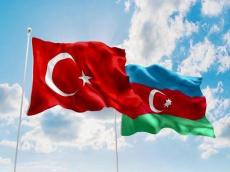|
|
TODAY.AZ / Business
Azerbaijan's foreign trade landscape: Turkiye emerges as key partner
14 June 2024 [08:30] - TODAY.AZ
 Ulviyya Shahin
Ulviyya Shahin
In January-April 2024, legal and natural persons from Azerbaijan conducted trade operations with partners in 156 countries worldwide, exporting products to 100 countries and importing from 148 countries, Azernews reports citing the Statistics Committee.
According to the data, Italy accounted for 22.3% of the country's foreign trade turnover, followed by Turkiye at 14.9%, Russia at 9.6%, China at 7.6%, Israel at 4.7%, India at 4.3%, Germany at 4.0%, Australia at 2.2%, the Czech Republic at 2.1%, and Romania and Georgia each at 1.7%. Thailand stood at 1.6%, the United States at 1.5%, Bulgaria and Greece each at 1.4%, and Iran, Ukraine, and Turkmenistan each at 1.3%. Belarus, Korea, and France accounted for 1.0% each, while Tunisia and Portugal each represented 0.9%. Additionally, 10.7% of trade transactions were conducted with other countries.
Azerbaijan, situated at the crossroads of Eastern Europe and Western Asia, has a diverse economy driven by its rich energy resources, particularly oil and natural gas. Over the past few decades, the country has undergone significant economic transformation, spurred by its strategic location, ambitious development plans, and efforts to diversify its economic base beyond the energy sector.
Following the dissolution of the Soviet Union in 1991, Azerbaijan emerged as an independent nation, inheriting a centrally planned economy. Since then, the government has implemented extensive reforms to liberalize the economy, attract foreign investment, and promote private sector development. These reforms, coupled with prudent macroeconomic policies, have laid the groundwork for sustained economic growth and stability.
Azerbaijan's economy experienced rapid expansion during the early 2000s, fueled by soaring oil prices and large-scale energy projects, such as the development of the Baku-Tbilisi-Ceyhan pipeline. The energy sector became the cornerstone of the economy, contributing significantly to government revenues and export earnings.
However, recognizing the vulnerability of an economy overly reliant on oil and gas, Azerbaijan has pursued a policy of economic diversification in recent years. Efforts have been made to bolster non-energy sectors such as agriculture, manufacturing, tourism, and transportation. These diversification initiatives aim to reduce dependence on hydrocarbon revenues, create job opportunities, and foster sustainable economic growth.
Foreign trade plays a crucial role in Azerbaijan's economic landscape, facilitating the exchange of goods and services with partners worldwide. The country's strategic location, at the crossroads of Europe and Asia, provides access to key markets and trading routes. Azerbaijan's trade relations extend to numerous countries across the globe, reflecting its efforts to foster international economic cooperation and integration.
The Statistics Committee of Azerbaijan serves as the primary authority responsible for collecting, analyzing, and disseminating statistical data related to various aspects of the economy, including foreign trade. Reports from the Statistics Committee provide valuable insights into the trends and dynamics of Azerbaijan's trade relations with other nations, helping policymakers, businesses, and investors make informed decisions.
Against this backdrop, the recent report indicating Turkiye's significant share in Azerbaijan's foreign trade turnover underscores the importance of bilateral economic ties between the two countries. Turkiye, as a close neighbor and key trading partner, plays a pivotal role in Azerbaijan's trade dynamics, contributing to the mutual prosperity and economic development of both nations.
URL: http://www.today.az/news/business/249560.html
 Print version
Print version
Connect with us. Get latest news and updates.
See Also
- 23 January 2026 [10:42]
S&P Global Ratings Sees Azerbaijan’s Banks Remaining Resilient in 2026 - 23 January 2026 [10:00]
Baku brings together regional leaders for clean energy transition discussions - 22 January 2026 [12:22]
Azerbaijan–US trade in 2025 falls from 2024 but remains above earlier years - 22 January 2026 [11:38]
SOCAR acquires 10% stake in Eni’s Baleine oil and gas project offshore Côte d’Ivoire - 22 January 2026 [10:42]
Foreign investment in Azerbaijan rises sharply with UK and UAE leading - 22 January 2026 [10:21]
Washington and Baku deepen economic ties with new business mission - 21 January 2026 [03:12]
Azerbaijan targets 8 gigawatts of solar and wind power by 2032, President says - 20 January 2026 [14:08]
Armenia explores new route for Russian gas imports via Azerbaijan amid Iran, Lars border challenges - 15 January 2026 [13:22]
China’s CNCEC, Azerbaijan’s SOCAR strengthen energy partnership - 14 January 2026 [19:22]
bp introduces innovative drilling fluid recycling in Azerbaijan, Georgia, and Türkiye
Most Popular
 South Caucasus - from era of war to era of peace
South Caucasus - from era of war to era of peace
 President Ilham Aliyev meets with his Israeli counterpart in Davos
President Ilham Aliyev meets with his Israeli counterpart in Davos
 President Ilham Aliyev meets with Prime Minister of Czech Republic in Davos
President Ilham Aliyev meets with Prime Minister of Czech Republic in Davos
 President Ilham Aliyev meets with President of Brookfield Asset Management in Davos
President Ilham Aliyev meets with President of Brookfield Asset Management in Davos
 A correspondence that says more than it seems
A correspondence that says more than it seems
 President Ilham Aliyev meets with President of Dell Technologies in Europe, Middle East, and Africa in Davos
President Ilham Aliyev meets with President of Dell Technologies in Europe, Middle East, and Africa in Davos
 Rutte: Ukraine is NATO's main issue, not Greenland
Rutte: Ukraine is NATO's main issue, not Greenland
